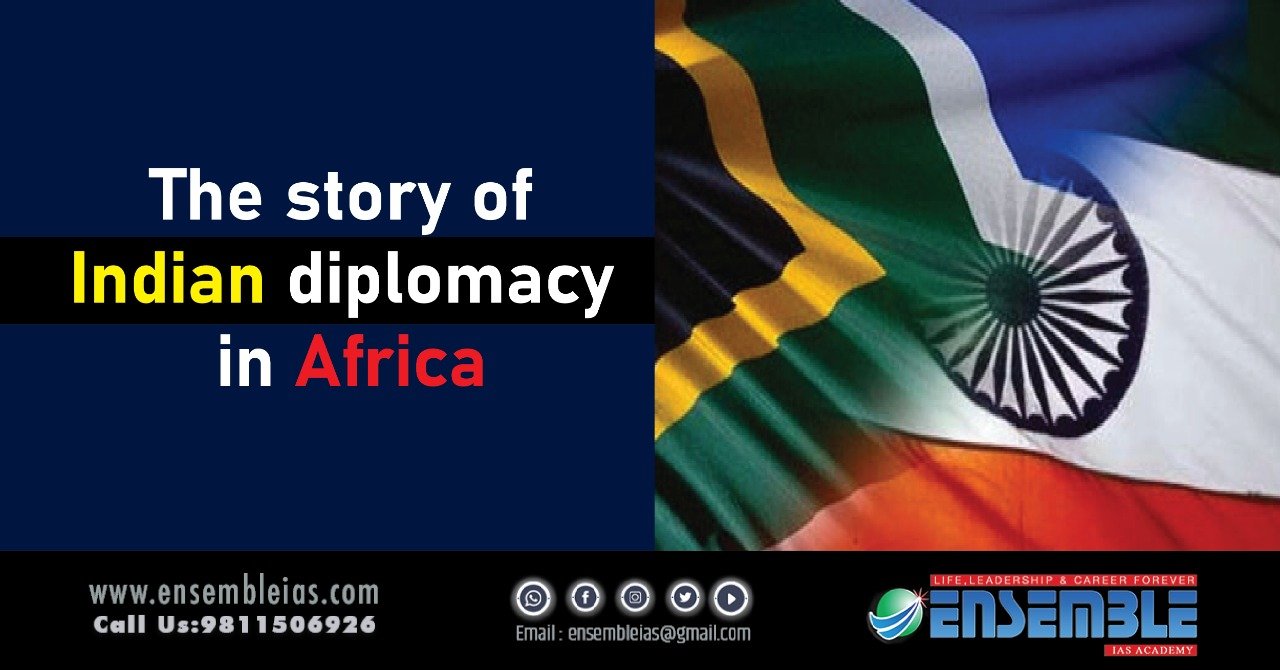The story of Indian diplomacy in Africa:
With the devastation wreaked by the second wave of Covid-19 being felt in India, there has been much criticism of the government’s so-called vaccine diplomacy. The Narendra Modi-led government aimed to become one of the major global suppliers of Covid-19 vaccines, pledging deliveries to many countries. While this pledge directly targeted India’s neighbours in South Asia as well as Seychelles, Myanmar and Mauritius, it also encompassed providing 10 million vaccine doses to the African continent.
To buy our online courses: Click Here
There is no question, India should have first supplied its own population before exporting doses. But, in principle, the idea of India deepening its footprint in Africa through a vaccine strategy was forward-thinking, and were India not struggling domestically today to vaccinate its own population, could have paid dividends. Although India has immense social capital among African nations, it has not matched this in material ties, and China’s economic and investment presence in Africa has been outstripping India’s for many years.
India’s modern ties to Africa go back decades. From Indian trade with and immigration to Africa during the British colonial years to India’s anti-colonial national movement, and its subsequent pioneering of the Non-Aligned Movement (NAM), India established many links to African nations.
On the one hand, Indian traders travelled regularly to the East African coast, forming relationships with local inhabitants in ports such as Mombasa and Dar es Salaam as well as with other foreign traders, leading to the establishment of Africa-based family businesses, some of which exist even today.
The story of Indian diplomacy in Africa:
On the other, India’s foreign policy ideas after Independence impacted African decolonisation movements. India’s role in organising the 1955 Bandung conference hosted by Indonesia, for example, was a seminal event. The conference marked the first time that Asian and African countries came together to denounce imperialism and colonialism, and affirm their independence from meddling superpowers. It was also the event at which the seeds of non-alignment were sown.
Ancient though these histories may sound today, the fact remains that African countries remember their shared commitment with India to resisting colonialism, and shaping an international order that they hoped would be markedly different from the previous era. This combined with the presence of an influential Indian diaspora has meant that India has meaningful, and positive, relationships with many African countries, and a reputation that China is currently aspiring to acquire.
In some ways, this positive relationship has paid off. The India-Africa Framework for Strategic Cooperation signed in 2015 provided impetus to India-Africa trade. In 2018, India was second only to China in its trade volume with sub-Saharan Africa. India exported agricultural commodities, pharmaceuticals, iron and steel, and automobile parts, among other goods, to Africa. Moreover, there was significant collaboration set up around food security — for example, the Nigerian company Tropical General Investments (TGI) has been buying machinery for its factories from Indian manufacturers while exporting its food products, sourced from raw materials in Africa, to Indian markets. At the same time, India’s diplomatic presence increased in Africa as it opened 18 new embassies in the past three years.
The story of Indian diplomacy in Africa:
Yet, despite these achievements, India’s presence in Africa has also lagged significantly behind China. Not only does China’s economic footprint in Africa dwarf that of India, with over 10,000 Chinese firms operating on the continent and China becoming Africa’s largest trading partner, but with the Belt and Road Initiative (BRI) projects, China is offering more than simply large infrastructure projects and investments. China is essentially trying to offer an alternative authoritarian model of development to African countries. Its message is that no longer is the liberal international path the only road for African countries to take and prosper.
But the truth is, had India’s investments in Africa kept any kind of comparable pace with that of China, it could have made deeper inroads today. Because of the social capital India has in Africa, acquired through the historical, political, economic and people-to-people ties mentioned here, its presence is welcomed by African countries in a way that China’s is not. There is not a whiff, for example, of the accusations of neo-imperialism aimed at Chinese companies. Companies such as Tata Motors in South Africa, Bharti Airtel one of the largest telecom operators on the continent, and the Aditya Birla Group are seen as beneficial for Africa.
Also Read: Understanding The Politics Of Patents
Thus, India’s vaccine diplomacy could have paid off. Although China has also been offering its vaccines to African nations, there are serious doubts about their efficacy. A thought-fully planned vaccine strategy that prioritised Indians at home, and then turned its attention to other countries would have reaped immense results and delivered a hugely successful foreign policy outcome. Unfortunately, that’s not how it unfolded. But as China is still struggling to ramp up the efficacy of its vaccines, perhaps there may still be a shot for the government to reboot its strategy once the pandemic is under control at home.




